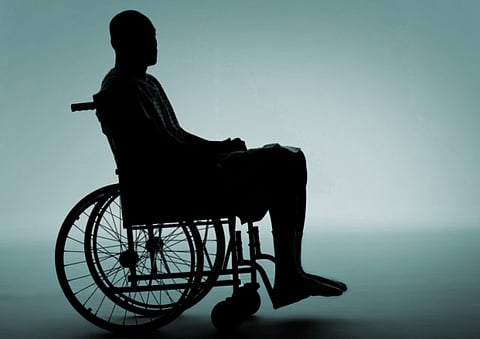Tailor diagnosed with leprosy longs for home
Sponsor unwilling to send him home

Abu Dhabi: An Indian tailor diagnosed with leprosy, who had been unable to return to his home country for treatment following objection by his sponsor, has got his passport back after the Indian embassy’s intervention, XPRESS can reveal.
“My sponsor is not willing to send me to India. He does not understand the seriousness of my condition and is forcing me to work for him,” S.H., 44, told XPRESS.
“I was kicked out of my room because my body was reeking. Nobody wants to come near me or touch me,” said S.H., who hails from New Delhi.
He now lives in his single-room shop in Mirfa, around 150km from Abu Dhabi city.
Father of three children, S.H. was diagnosed with leprosy by dermatologists at Ahalia Hospital on August 10. He sought medical help after he felt numbness on the big toes on both feet, followed by eruption of blisters on his fingers.
He said knows the symptoms too well because he has a medical history and had undergone treatment for leprosy in India before coming to the UAE two months ago.
“That is how it all started for me – numbness on my big toes and a few sores. Then in a few months the sores spread all over my body. The smell was so bad that I could not stand it myself.”
The condition is a traumatic one as lepers are avoided by society in general in India. But S.H. says he was lucky to have a supportive family who allowed him to stay in a separate room in the house during his treatment.
“I was taking medicines for more than a year, and doctors told me that I was cured completely. I thought I was lucky when I got a chance to come to the UAE two months ago. I even cleared the medical test and got my employment visa.”
According to the UAE law, those coming to the UAE for the first time should be subject to medical tests for tuberculosis and leprosy other than AIDS and Hepatitis B before they are granted residence visas. Those who are found suffering from any of these diseases would be deported, according to the 2010 cabinet decision number 28.
According to S.H., what triggered a relapse could have been his diet that included fish. “Doctors had warned me not to have fish because it is like poison for my body. But after the medical test, I took it easy and started having fish,” he said.
S.H. now wants to go home to resume treatment. “If the blisters spread all over, it is painful and traumatic not only for myself but also for those who come in contact with me.”
Ahalia Hospital, that confirmed the diagnosis, said they have followed the government protocol and have informed the health authorities. “After the initial diagnosis we have done a biopsy and are awaiting the results,” said the spokesperson.
S.H. said he has approached the Indian embassy in Abu Dhabi which has now taken up the matter with authorities to expedite his repatriation.
“We have got his passport from the sponsor and should be able to send him home in a few days,” an embassy official told XPRESS.
Leprosy facts:
Leprosy is caused by a slow-growing bacillus, Mycobacterium leprae. It is transmitted via droplets from the nose and mouth of untreated patients. The disease can cause nerve damage, leading to muscle weakness and atrophy, and permanent disabilities. The parasitic rod-shaped germ that causes leprosy can be killed by multi-drug therapy, or MDT, which is a cocktail of three antibiotics. Leprosy has been eliminated from 119 countries out of 122 countries where the disease was considered a public health problem in 1985.
You speak
Share your thoughts on the story
Write to us at:
news@xpress4me.com
sms 5101



